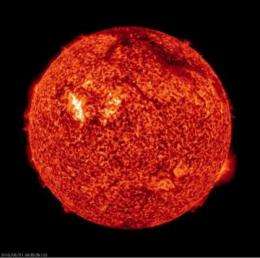Solar activity playing a minimal role in global warming, research suggests

Changes in solar activity have contributed no more than 10 per cent to global warming in the twentieth century, a new study has found.
The findings, made by Professor Terry Sloan at the University of Lancaster and Professor Sir Arnold Wolfendale at the University of Durham, find that neither changes in the activity of the Sun, nor its impact in blocking cosmic rays, can be a significant contributor to global warming.
The results have been published today, 8 November, in IOP Publishing's journal Environmental Research Letters.
Changes in the amount of energy from the Sun reaching the Earth have previously been proposed as a driver of increasing global temperatures, as has the Sun's ability to block cosmic rays. It has been proposed that cosmic rays may have a role in cooling the Earth by encouraging clouds to form, which subsequently reflect the Sun's rays back into space.
According to this proposal, in periods of high activity the Sun blocks some of the cosmic rays from entering the Earth's atmosphere, so that fewer clouds form and the Earth's surface temperatures rise.
In an attempt to quantify the effect that solar activity—whether directly or through cosmic rays—may have had on global temperatures in the twentieth century, Sloan and Wolfendale compared data on the rate of cosmic rays entering the atmosphere, which can be used as a proxy for solar activity, with the record of global temperatures going back to 1955.
They found a small correlation between cosmic rays and global temperatures occurring every 22 years; however, the changing cosmic ray rate lagged behind the change in temperatures by between one and two years, suggesting that the cause may not be down to cosmic rays and cloud formation, but may be due to the direct effects of the Sun.
By comparing the small oscillations in cosmic ray rate, which was taken from data from two neutron monitors, and temperature with the overall trends in both since 1955, Sloan and Wolfendale found that less than 14 per cent of the global warming seen during this period could be attributable to solar activity.
Furthermore, the researchers reviewed their own previous studies and surveyed the relevant literature to find other evidence of a link between solar activity and increasing global temperatures existing. Their findings indicated that overall, the contribution of changing solar activity, either directly or through cosmic rays, was even less cannot have contributed more than 10 per cent to global warming in the twentieth century.
They concluded that the paleontological evidence, derived from carbon and oxygen isotopes, was "weak and confused" and that a more-up-to-date study linking cosmic rays with low-level cloud cover was flawed because the correlation only occurred in certain regions rather than the entire globe.
Sloan and Wolfendale also discussed the results from the CLOUD experiment at CERN, where researchers are looking at ways in which cosmic rays can ionize, or charge, aerosols in the atmosphere, which can then influence how clouds are formed. They also examined instances where real-world events produced large-scale ionization in the atmosphere.
Events such as the Chernobyl nuclear disaster and nuclear weapons testing would have been expected to have affected aerosol production in the atmosphere, but no such effects could be seen.
Professor Sloan said: "Our paper reviews our work to try and find a connection between cosmic rays and cloud formation with changes in global temperature.
"We conclude that the level of contribution of changing solar activity is less than 10 per cent of the measured global warming observed in the twentieth century. As a result of this and other work, the IPCC state that no robust association between changes in cosmic rays and cloudiness has been identified."
More information: 'Cosmic rays, solar activity and the climate' T Sloan and A W Wolfendale 2013 Environ. Res. Lett. 8 045022. iopscience.iop.org/1748-9326/8/4/045022/article
Journal information: Environmental Research Letters
Provided by Institute of Physics


















